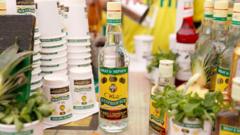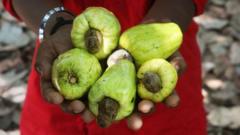Jamaica's rum industry is in the spotlight due to a contentious dispute regarding the geographical indication (GI) designation for Jamaican rum, which is vital for both cultural identity and economic significance. In late 2022, amendments to this designation enacted by the Jamaica Intellectual Property Office (JIPO) prohibit the aging of Jamaican rum outside the island. This shift has provoked backlash from major players in the rum sector, particularly National Rums of Jamaica (NRJ), which could face dire consequences if the amendments go through unchanged. The Spirits Pool Association (SPA), representing the interests of smaller distilleries, advocates for stronger protections that would enhance the reputation of Jamaican rum globally. Simultaneously, the ongoing debate hints at broader implications, including how geographic indicators can shape market perceptions and preserve brand integrity.
What Defines Jamaican Rum? Ongoing Legal Battle in the Caribbean

What Defines Jamaican Rum? Ongoing Legal Battle in the Caribbean
A pivotal legal situation is unfolding in Jamaica concerning the definition of what constitutes "Jamaican rum."
The article text appears below:
Rum is a keystone of Jamaica's cultural identity, yet there's ongoing debate about what truly defines it as "Jamaican." This question is central to a legal dispute currently impacting the Caribbean island, where some producers are advocating for stricter regulations regarding the use of the term "Jamaican rum."
In October of last year, amendments were approved by Jamaica's Intellectual Property Office (JIPO) to update the geographical indication (GI) designation for Jamaican Rum, a system that was first established in 2016. A significant change under the new regulations is the prohibition of aging rum outside Jamaica. This amendment was driven by the Spirits Pool Association (SPA), which represents the collective interests of Jamaica's six rum distilleries: Appleton (owned by J Wray and Nephew), Clarendon, Hampden Estate, Long Pond, New Yarmouth, and Worthy Park Estate.
The SPA argues that a more robust GI is essential for the prestigious title to be recognized in key export markets such as Europe and the United States. According to the SPA, this enhancement would provide Jamaican rum with improved protection against rivals and help it be recognized as a premium product made following strict standards in a specific geographic region.
However, this amendment has sparked controversy, especially among larger producers, as National Rums of Jamaica (NRJ)—which owns significant assets like Long Pond and 73% of Clarendon—claims that the new regulations threaten its business model. NRJ's shareholders include the Jamaican government, Demerara Distillers of Guyana, and the West Indies Rum Distillery (WIRD), which has been operated by the French company Maison Ferrand since 2017. This company's operational model heavily relies on exporting rum in bulk and aging it outside of Jamaica, a practice that would be deemed unacceptable under the new GI rules.
NRJ argues that rum aged outside of Jamaica still possesses a connection to the island's heritage and traditions, asserting that aging practice has been a part of its history for centuries. The NRJ has formally challenged JIPO's ruling, with a hearing set for April 28, 2023.
The SPA has reacted by highlighting that WIRD's objections seem to have arisen only following its acquisition by Maison Ferrand, paving the way for questions about genuine dedication to Jamaican rum authenticity. Christopher Gentles, SPA's general manager, notes that aging rum in Jamaica is crucial to maintaining its unique identity and quality and expresses confusion over NRJ's opposition.
Additionally, SPA points out that allowing rum to be produced and aged abroad could deprive Jamaica of various local economic benefits, including job creation through refining, bottling, and distribution, as well as opportunities for rum tourism.
The significance of geographical indications in establishing the identity and authenticity of products cannot be understated. As Dev Gangjee, a professor of intellectual property law at the University of Oxford, notes, GIs can lead to increased prices and create regional pride, while simultaneously preventing products from losing their uniqueness. Examples like Scotch whisky and champagne highlight the potential advantages of robust GI protections.
In parallel, Barbados faces its own GI challenges related to rum production, with debate surrounding proposed GI regulations. Four of its five distilleries are in agreement, but WIRD's objection to conditions against overseas aging has stalled progress. Producers like Richard Seale view GIs as vital for preserving intrinsic local industries.
In Jamaica, the SPA aims for the country's rum to gain EU's Protected Geographical Indication classification, though this is contingent on the resolution of ongoing proceedings at JIPO. Gentles expressed hope that a compromise can be found, emphasizing the shared goal of protecting the heritage linked to Jamaican rum, even if it means making some concessions.
The debate reflects not only an economic duel but also a profound sense of pride and history connected to Jamaican rum. Several Jamaican news outlets have backed the JIPO's decisions, underlining the need for collective efforts to maintain the integrity of Jamaican brands against outside appropriation, declaring that foreign ownership of culturally significant products must come with a commitment to uphold their authenticity.
Rum is a keystone of Jamaica's cultural identity, yet there's ongoing debate about what truly defines it as "Jamaican." This question is central to a legal dispute currently impacting the Caribbean island, where some producers are advocating for stricter regulations regarding the use of the term "Jamaican rum."
In October of last year, amendments were approved by Jamaica's Intellectual Property Office (JIPO) to update the geographical indication (GI) designation for Jamaican Rum, a system that was first established in 2016. A significant change under the new regulations is the prohibition of aging rum outside Jamaica. This amendment was driven by the Spirits Pool Association (SPA), which represents the collective interests of Jamaica's six rum distilleries: Appleton (owned by J Wray and Nephew), Clarendon, Hampden Estate, Long Pond, New Yarmouth, and Worthy Park Estate.
The SPA argues that a more robust GI is essential for the prestigious title to be recognized in key export markets such as Europe and the United States. According to the SPA, this enhancement would provide Jamaican rum with improved protection against rivals and help it be recognized as a premium product made following strict standards in a specific geographic region.
However, this amendment has sparked controversy, especially among larger producers, as National Rums of Jamaica (NRJ)—which owns significant assets like Long Pond and 73% of Clarendon—claims that the new regulations threaten its business model. NRJ's shareholders include the Jamaican government, Demerara Distillers of Guyana, and the West Indies Rum Distillery (WIRD), which has been operated by the French company Maison Ferrand since 2017. This company's operational model heavily relies on exporting rum in bulk and aging it outside of Jamaica, a practice that would be deemed unacceptable under the new GI rules.
NRJ argues that rum aged outside of Jamaica still possesses a connection to the island's heritage and traditions, asserting that aging practice has been a part of its history for centuries. The NRJ has formally challenged JIPO's ruling, with a hearing set for April 28, 2023.
The SPA has reacted by highlighting that WIRD's objections seem to have arisen only following its acquisition by Maison Ferrand, paving the way for questions about genuine dedication to Jamaican rum authenticity. Christopher Gentles, SPA's general manager, notes that aging rum in Jamaica is crucial to maintaining its unique identity and quality and expresses confusion over NRJ's opposition.
Additionally, SPA points out that allowing rum to be produced and aged abroad could deprive Jamaica of various local economic benefits, including job creation through refining, bottling, and distribution, as well as opportunities for rum tourism.
The significance of geographical indications in establishing the identity and authenticity of products cannot be understated. As Dev Gangjee, a professor of intellectual property law at the University of Oxford, notes, GIs can lead to increased prices and create regional pride, while simultaneously preventing products from losing their uniqueness. Examples like Scotch whisky and champagne highlight the potential advantages of robust GI protections.
In parallel, Barbados faces its own GI challenges related to rum production, with debate surrounding proposed GI regulations. Four of its five distilleries are in agreement, but WIRD's objection to conditions against overseas aging has stalled progress. Producers like Richard Seale view GIs as vital for preserving intrinsic local industries.
In Jamaica, the SPA aims for the country's rum to gain EU's Protected Geographical Indication classification, though this is contingent on the resolution of ongoing proceedings at JIPO. Gentles expressed hope that a compromise can be found, emphasizing the shared goal of protecting the heritage linked to Jamaican rum, even if it means making some concessions.
The debate reflects not only an economic duel but also a profound sense of pride and history connected to Jamaican rum. Several Jamaican news outlets have backed the JIPO's decisions, underlining the need for collective efforts to maintain the integrity of Jamaican brands against outside appropriation, declaring that foreign ownership of culturally significant products must come with a commitment to uphold their authenticity.





















